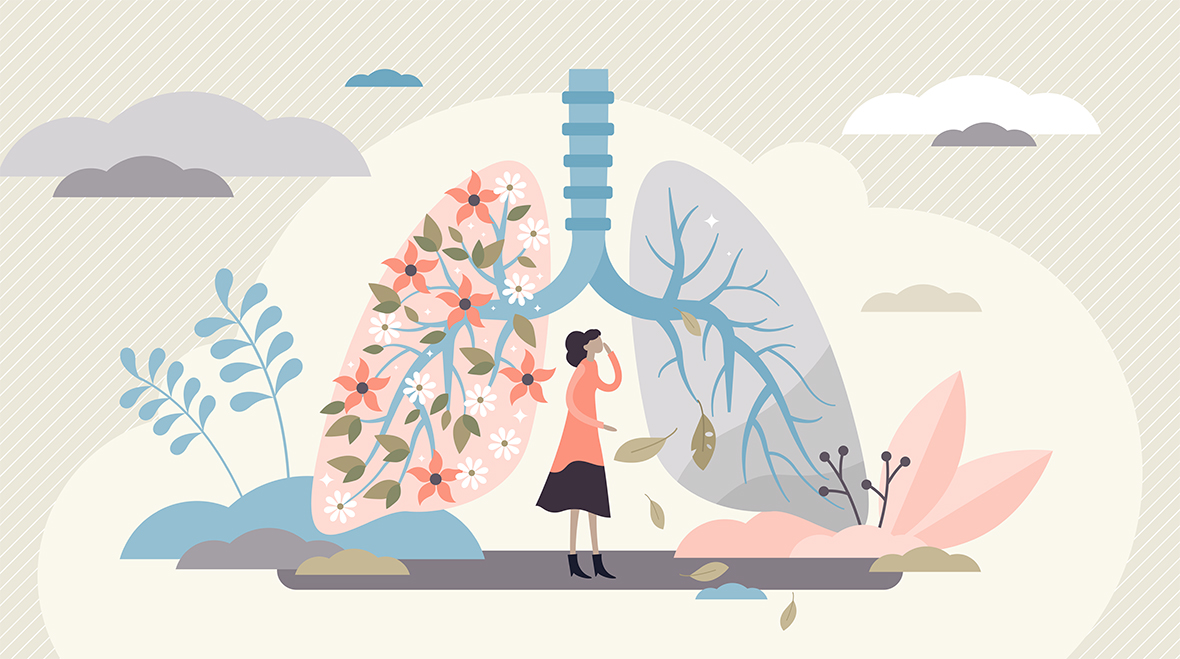
The pandemic has been a huge challenge for people with lung disease – Dr Nick Hopkinson outlines what needs to change to provide them with the required support.
The COVID-19 pandemic has had a double impact on people with lung disease – both the impact of the condition itself as well as measures to avoid it on individuals and the impact on access to healthcare. COVID-19 is a respiratory infection, with people with COPD and severe asthma among those who are the most vulnerable. Many people with these conditions have spent a year shielding to avoid it.
Data from patient surveys by the Asthma UK and British Lung Foundation Partnership early in the pandemic found high levels of anxiety, with four key themes emerging from survey responses:
- Individuals’ vulnerability to COVID-19,
- Worrying what the experience of contracting COVID-19 would be like,
- Uncertainty about the future,
- The inadequacy of government response.
Many patients reported that their care had been disrupted, with reduced support available and face to face appointments replaced by remote options.
The consequences of COVID-19 extend beyond the initial acute infection
In a further survey of 4,500 people with asthma conducted in October 2020, 10·5% reported having had COVID and half of these reported having long-COVID symptoms. Experiences following COVID were highly variable in terms of severity, duration, and pattern of recovery. Importantly, COVID symptoms were felt to overlap and interact with asthma – increased breathlessness, increased inhaler use, and worsening asthma control were common. Experiences accessing healthcare were also highly variable but many felt that their condition was not taken seriously.
These responses match those of another large survey undertaken by AUK-BLF, via its post-COVID hub. In 3290 individuals who reported that they had long-COVID, the most common ongoing symptoms reported were as follows:
[infogram id=”the-most-common-ongoing-long-covid-symptoms-reported-amongst-people-with-lung-disease-1h7z2l87ly0gx6o?live”]
Symptoms often fluctuated from day to day. Many had become unwell before testing was widely available and felt that because of this their symptoms were not being taken seriously, leading to unsatisfactory interactions with healthcare. The survey identified a clear need for better understanding of the condition and the development of services that address the experience of living with long-COVID.
What needs to change?
Two points for the future. First, people with ongoing symptoms post-COVID are going to require a range of rehabilitation services. Even prior to the pandemic there was enormous unmet need for pulmonary rehabilitation. It is important therefore to ensure that the pandemic response now includes a radical expansion of these services, rather than simply adding post-COVID patients to the competition for limited places.
Secondly, one consequence of measures to contain the spread of COVID-19 has been a dramatic reduction in the transmission of other viruses. This has led to many fewer acute attacks of asthma and COPD than in previous years. In the light of this, when asked to consider their likely future behaviour, a majority of people with lung disease surveyed expect to continue to take additional measures even after the pandemic has passed and wish other people to do this also; 79.5% would continue increased handwashing, 68.6% social distancing indoors, 46.9% would continue to wear a face covering in indoor public places (45.7% on public transport), and 59.3% would avoid friends and family who were unwell with a respiratory infection. Of note, 45.6% wanted healthcare professionals to continue wearing a mask when seeing patients. 60.7% thought that face coverings should continue to be worn by everyone in indoor public spaces during the ‘flu season.
The COVID pandemic has been a huge challenge for people with lung disease and those who care for them. As well as vulnerability to the virus itself and a need to shield for long periods, many people have had their respiratory care delayed or cancelled. This needs to be addressed if we are to “build back fairer” and provide them with the support that they deserve.
Dr Nick Hopkinson (@COPDdoc) is a Reader in Respiratory Medicine at Imperial’s National Heart and Lung Institute, Honorary Consultant Chest Physician at The Royal Brompton Hospital and Medical Director at the British Lung Foundation.
Read other posts by Dr Nick Hopkinson.
- Buttery Sara C et al. Patient Symptoms and Experience Following Covid-19: Results from a Uk Wide Survey. medRxiv (2021): 2021.04.15.21255348. https://dx.doi.org/10.1101/2021.04.15.21255348.
- Philip, K. et al. Respiratory Patient Experience of Measures to Reduce Risk of Covid-19: Findings from a Descriptive Cross-Sectional Uk Wide Survey. BMJ Open 10, no. 9 (Sep 9 2020): e040951. https://dx.doi.org/10.1136/bmjopen-2020-040951.
- Philip, K. et al. Covid-19 Related Concerns of People with Long-Term Respiratory Conditions: A Qualitative Study. BMC Pulm Med 20, no. 1 (Dec 9 2020): 319. https://dx.doi.org/10.1186/s12890-020-01363-9.
- Philip, K et al Patient Experience of COPD Care: Outcomes from the British Lung Foundation Patient Passport. BMJ Open Respiratory Research 6, no. 1 (2019): e000478. https://dx.doi.org/10.1136/bmjresp-2019-000478.
- Philip, K. Impact of COVID-19 on People with Asthma: A Mixed Methods Analysis from a UK Wide Survey (3/25/2021). http://dx.doi.org/10.2139/ssrn.3813368